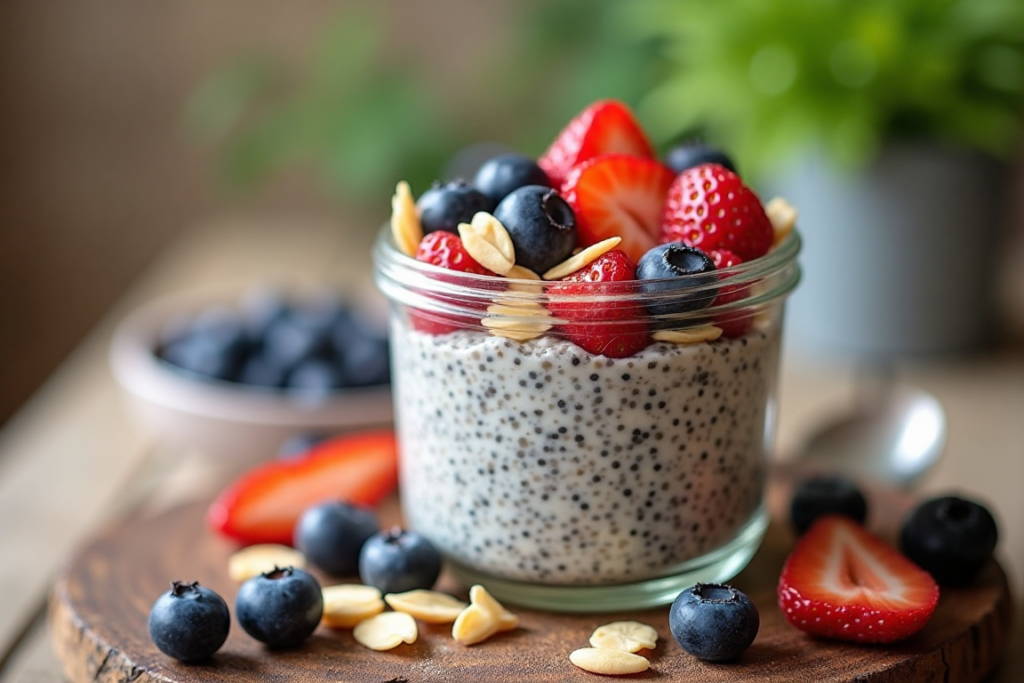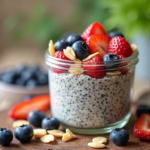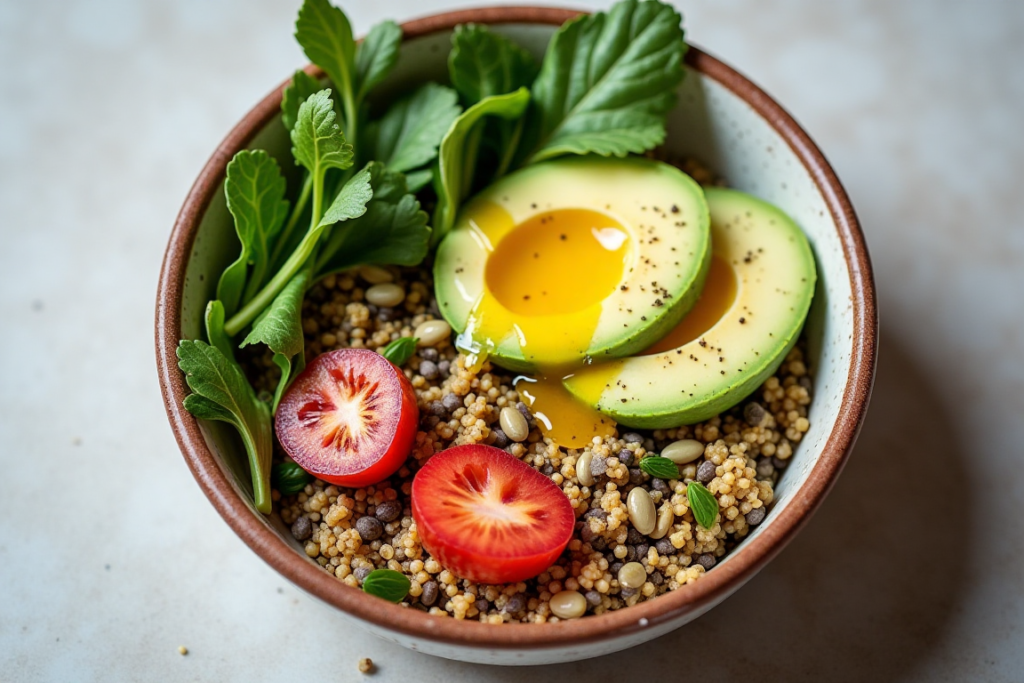A healthy breakfast fuels your body, boosts brain function, and keeps you energized throughout the day.
Breakfast is often called the most important meal of the day—but does it really matter when you eat it? Should you eat immediately after waking up, or is it better to wait? What happens if you skip breakfast altogether? If you’ve ever wondered about the best time to eat a healthy breakfast, this guide will clear up all your questions.
A well-balanced breakfast can set the tone for your entire day. It fuels your body, boosts brain function, and keeps you energized. But getting the timing right is just as important as what you eat. Let’s explore the best time to enjoy your morning meal for maximum health benefits.
The Importance of Eating a Nutritious Healthy Breakfast
How Breakfast Affects Your Energy Levels
Ever feel sluggish in the morning? That’s because your body has been fasting overnight. Eating a nutrient-rich breakfast helps restore energy levels and prevents mid-morning crashes. When you wake up, your blood sugar levels are usually low, and a balanced meal helps regulate them.
“A good is a healthy breakfast gives you the energy you need to tackle your day, keeping both your mind and body sharp.”
- Protein (eggs, Greek yogurt, nuts) helps with muscle repair and satiety.
- Fiber (oats, whole grains, fruits) supports digestion and keeps you full longer.
- Healthy fats (avocados, seeds, nut butter) provide sustained energy and brain power.
The Role of Breakfast in Metabolism and Weight Management
Did you know that eating a healthy breakfast can jumpstart your metabolism? When you eat in the morning, your body shifts from fasting mode to burning calories efficiently. Studies suggest that people who eat breakfast tend to have a higher metabolic rate than those who skip it.
Additionally, eating a protein-rich breakfast can help with weight management by reducing cravings later in the day. Skipping breakfast often leads to excessive hunger, which increases the likelihood of overeating unhealthy snacks or large meals later.
What Time Should You Eat Breakfast for Maximum Benefits?
The Best Time to Eat Breakfast According to Science
So, when exactly should you eat your first meal of the day? According to experts, the ideal time to eat breakfast is within 1-2 hours after waking up. This helps stabilize blood sugar levels and provides your body with the energy it needs.
Here’s why eating within this time frame is beneficial:
- It prevents prolonged fasting, which can slow down metabolism.
- It helps regulate appetite and prevents extreme hunger later in the day.
- It improves focus and productivity by fueling your brain early.
Should You Eat Breakfast Immediately After Waking Up?
Not everyone feels hungry the moment they wake up. If you’re someone who prefers to wait, that’s okay! However, waiting too long (more than 3-4 hours) might lead to energy dips and increased cravings. If you’re not hungry right away, try a light healthy breakfast like a smoothie, yogurt, or fruit.
How Meal Timing Affects Digestion and Blood Sugar
Eating breakfast at the right time also helps regulate blood sugar levels. If you delay your first meal for too long, your blood sugar may drop too low, causing dizziness, fatigue, and irritability.
| Meal Timing | Effect on Blood Sugar |
|---|---|
| Within 1-2 hours of waking | Steady blood sugar, sustained energy |
| After 3-4 hours | Possible energy dip, increased cravings |
| Skipping breakfast | Blood sugar fluctuations, hunger pangs |
What Happens If You Skip Breakfast?
The Effects of Skipping Breakfast on Your Body
Some people believe that skipping breakfast is harmless, but it can have several downsides, including:
- Lower energy levels
- Poor concentration and brain fog
- Increased hunger and overeating later in the day
- Slower metabolism
Skipping breakfast regularly can also impact long-term health. Studies show that people who consistently miss breakfast may have a higher risk of developing type 2 diabetes and heart disease. If you’re not a fan of big breakfasts, try a small but nutritious meal like Greek yogurt with nuts or a banana with peanut butter.
Does Skipping Breakfast Help with Weight Loss?
There’s a common myth that skipping breakfast helps with weight loss. While intermittent fasting may work for some people, for many, it leads to overeating later in the day. When you go too long without food, your body craves high-calorie, carb-heavy foods, making it harder to make healthy choices.
“Skipping breakfast to lose weight can backfire by making you hungrier later, leading to unhealthy snacking.”
If your goal is weight loss, focus on eating a balanced breakfast that includes protein, fiber, and healthy fats. This keeps you full and reduces cravings throughout the day.
What Should a Healthy Breakfast Include?
The Key Nutrients Your Breakfast Should Contain
For a truly healthy breakfast, aim for a mix of these essential nutrients:
- Protein: Eggs, Greek yogurt, cottage cheese, lean meats, or plant-based proteins.
- Fiber: Oats, whole-grain bread, quinoa, chia seeds, or flaxseeds.
- Healthy fats: Avocado, nuts, seeds, olive oil, or nut butter.
- Vitamins and minerals: Fruits, leafy greens, and dairy products.
By balancing these nutrients, you’ll enjoy steady energy, improved digestion, and better overall health.
Best High-Protein Breakfasts for Sustained Energy
Looking for high-protein breakfast and healthy ideas? Try these:
- Scrambled eggs with avocado toast – A perfect balance of protein, fiber, and healthy fats.
- Greek yogurt with nuts and berries – Packed with probiotics, protein, and antioxidants.
- Oatmeal with almond butter and chia seeds – A fiber-rich meal that keeps you full longer.
- Protein pancakes – Try this high-protein pancake mix for a delicious, energy-boosting breakfast.
Eating the right breakfast at the right time can improve your health, energy, and focus throughout the day. Now that you know when and what to eat, let’s dive into some quick and easy breakfast recipes!
Common Mistakes to Avoid When Preparing a Healthy Breakfast
Even when you eat at the right time, certain breakfast mistakes can reduce the benefits of your morning meal. Let’s take a look at some common errors and how to fix them.
Eating Too Much Sugar in the Morning
Many popular breakfast options are packed with hidden sugars, which can cause blood sugar spikes and crashes. These sudden energy drops leave you feeling tired, hungry, and craving more sugar within a few hours.
Common high-sugar breakfast items to avoid:
- Flavored yogurts with added sugar
- Processed cereals and granola
- Pastries, muffins, and donuts
- White toast with jam
Better alternatives:
- Plain Greek yogurt with fresh fruit and nuts
- Oatmeal sweetened with a little honey or cinnamon
- Whole-grain toast with almond butter
Not Getting Enough Protein or Fiber
Eating a breakfast that’s mostly carbs and low in protein might give you a quick energy boost, but it won’t last long. Without enough protein and fiber, you’ll likely feel hungry again within an hour or two.
Why are protein and fiber important?
- Protein keeps you full longer and helps build muscle.
- Fiber supports digestion and stabilizes blood sugar levels.
Quick Fix: Swap refined carbs for high-protein and fiber-rich foods like eggs, Greek yogurt, whole grains, and nuts.
Eating Breakfast Too Late in the Day
Eating breakfast too late—more than 3-4 hours after waking up—can lead to unstable energy levels and increased cravings. Your body needs fuel early in the day to function properly.
Solution: If you’re not hungry in the morning, start small with a smoothie, a handful of nuts, or a boiled egg. Over time, your body will adjust to an earlier breakfast routine.
How to Build a Perfectly Balanced and Healthy Breakfast
Now that we’ve covered what not to do, let’s look at how to build the perfect breakfast plate.
The Ideal Macronutrient Ratio for Breakfast
A well-balanced breakfast should contain:
- 40% carbohydrates (whole grains, fruits, vegetables)
- 30% protein (eggs, dairy, lean meats, plant-based proteins)
- 30% healthy fats (avocados, nuts, seeds, olive oil)
| Nutrient | Best Breakfast Sources |
|---|---|
| Protein | Eggs, Greek yogurt, cottage cheese, nuts, seeds |
| Fiber | Oats, quinoa, whole-grain bread, flaxseeds, berries |
| Healthy Fats | Avocados, almond butter, olive oil, walnuts |
Food Combinations for Energy and Focus Healthy Breakfast
Want to feel energized all morning? Try these powerful breakfast combos:
- Oatmeal + Almond Butter + Banana – Slow-digesting carbs + protein + potassium
- Scrambled Eggs + Avocado Toast – Protein + fiber + healthy fats
- Greek Yogurt + Berries + Flaxseeds – Probiotics + antioxidants + omega-3s
Quick & Easy Healthy Breakfast Ideas
Looking for delicious and healthy breakfast recipes? Here are some quick and easy options.
Recipe 1: High-Protein Pancakes

These pancakes are packed with protein, making them a great option for sustained energy.
Ingredients:
- ½ cup protein pancake mix (Try this mix)
- 1 egg
- ½ cup almond milk
- 1 tsp cinnamon
- 1 tbsp almond butter
Instructions:
- Mix all ingredients in a bowl.
- Heat a non-stick pan over medium heat.
- Pour small portions of the batter and cook for 2 minutes per side.
- Serve with fresh berries and honey.
🥑 Recipe 2: Spinach & Feta Omelet (High-Protein & Low-Carb)

A savory and filling omelet packed with protein, vitamins, and minerals for an energizing morning.
Ingredients:
- 2 large eggs
- ¼ cup fresh spinach (chopped)
- 1 tbsp feta cheese (crumbled)
- ½ tsp olive oil
- Pinch of salt & black pepper
Instructions:
- Heat olive oil in a non-stick pan over medium heat.
- In a bowl, whisk eggs, salt, and pepper.
- Pour eggs into the pan and let cook for 1-2 minutes.
- Add spinach and feta on one side of the omelet.
- Fold the omelet in half and cook for another minute.
- Serve warm with whole-grain toast or fresh salad.
💡 Tip: Add a handful of cherry tomatoes or avocado slices for extra nutrients!
🍓 Recipe 3: Chia Pudding with Berries & Almonds (High-Fiber & Omega-3s)


Chia Pudding with Berries
Description
This overnight chia pudding is loaded with fiber, omega-3s, and antioxidants, perfect for meal prepping!
Ingredients
- 3 tbsp chia seeds
- 1 cup almond milk (or any milk of choice)
- 1 tsp honey or maple syrup
- ¼ cup mixed berries (blueberries, strawberries, raspberries)
- 1 tbsp sliced almonds
Instructions
- In a jar, mix chia seeds, almond milk, and honey.
- Stir well and refrigerate overnight (at least 4 hours).
- Before serving, stir again and top with berries and almonds.
Notes
Tip: Add a spoonful of Greek yogurt for extra creaminess and protein!
Recipe 4: Peanut Butter & Banana Smoothie (Protein-Packed & Quick)

A delicious and creamy smoothie that provides a quick energy boost and keeps you full for hours.
Ingredients:
- 1 banana
- 1 tbsp peanut butter
- 1 scoop vanilla protein powder
- 1 cup almond milk
- ½ tsp cinnamon
- Ice cubes (optional)
Instructions:
- Blend all ingredients until smooth.
- Pour into a glass and enjoy immediately!
💡 Tip: Add a handful of oats or chia seeds for extra fiber!
🥗 Recipe 5: Quinoa & Avocado healthy Breakfast Bowl (Superfood-Packed & Gluten-Free)

This hearty and nutritious breakfast bowl is filled with protein, fiber, and healthy fats for all-day energy.
Ingredients:
- ½ cup cooked quinoa
- ½ avocado (sliced)
- 1 boiled egg (sliced)
- 1 tbsp pumpkin seeds
- 1 tsp olive oil
- Pinch of salt & pepper
Instructions:
- In a bowl, place the cooked quinoa.
- Arrange sliced avocado and boiled egg on top.
- Sprinkle with pumpkin seeds, salt, and pepper.
- Drizzle with olive oil and enjoy!
💡 Tip: Swap the boiled egg for smoked salmon for extra protein and omega-3s!
Frequently Asked Questions About Eating Healthy Breakfast
Should You Eat Breakfast Immediately After Waking Up?
Not necessarily! Some people need time before their stomachs wake up. If that sounds like you, here’s what to do:
- Hydrate first – A glass of warm lemon water can stimulate digestion and prepare your body for food.
- Ease into eating – Start with something light like Greek Yogurt with Nuts & Berries or Chia Pudding with Berries for an easy-to-digest meal.
- Listen to your body – If you’re genuinely not hungry, don’t force it! Instead, try a small, protein-rich option like a handful of nuts or a Banana & Peanut Butter Smoothie to keep energy levels stable.
But waiting too long (beyond 4 hours) may lead to irritability, headaches, and excessive snacking. If you often delay breakfast, consider preparing a quick grab-and-go meal like Overnight Oats so you can eat when you’re ready.
What Is the Best Time to Eat Breakfast?
The best time to eat breakfast is within 1-2 hours of waking up to maintain energy levels and prevent cravings.
What Happens If You Eat Breakfast Too Late?
Pushing breakfast too far into the morning (beyond 3-4 hours after waking up) can have negative effects:
❌ Low energy levels – Your body needs fuel after fasting overnight.
❌ Uncontrollable cravings – You may compensate by eating more later.
❌ Slower metabolism – Your body remains in “fasting mode” for too long.
If you’re short on time in the morning, meal prepping can be a lifesaver! Try Overnight Oats or Chia Pudding with Berries to have a nutrient-packed meal ready to go.
What Should I Eat for Breakfast Every Day?
A mix of protein, fiber, and healthy fats—such as eggs, whole grains, fruits, and nuts—will provide long-lasting energy and overall health benefits.
Conclusion: Start Your Day the Right Way
Eating a healthy breakfast at the right time can improve your energy, focus, and metabolism. Whether you prefer sweet or savory options, the key is balance.
Tomorrow morning, choose a breakfast that fuels your body and brain—you’ll feel the difference! 🚀💪
Looking for More Healthy Breakfast Ideas?
Check out these delicious & nutritious recipes:
- Avocado Toast with Eggs 🥑
- Greek Yogurt with Nuts & Berries 🍓
- The Best Chili Soup Recipe 🌶️ (For a savory breakfast alternative!)
Further Reading: Try this Protein Pancake Mix for a high-protein morning boost!


3 thoughts on “When Should You Eat a Healthy Breakfast?”
Comments are closed.